Your cart is currently empty!
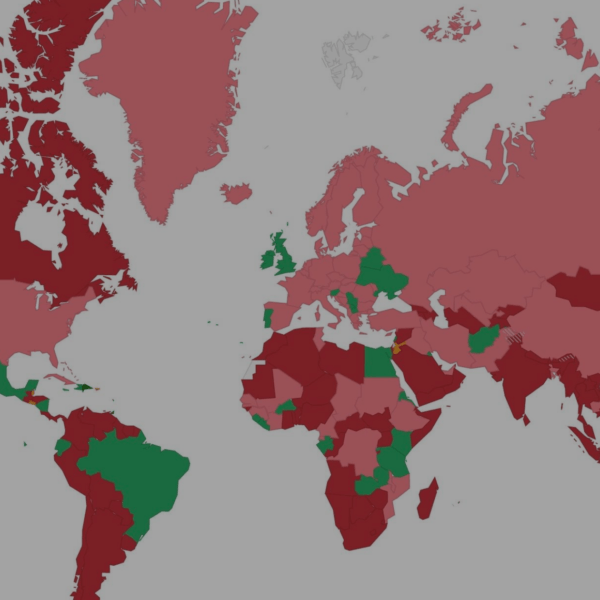
Travel during Coronavirus? – Before you Book
This is an article about the logistics of travel during Coronavirus. But, before we get into any of that, let’s address the burning question.
Should you travel during Coronavirus?
I can’t answer this question for you, but here’s what I know:
On the one hand, travel during COVID does spread the virus. That is why those in the scientific community urge us to self-quarantine at home – to slow the spread of infection and flatten the curve.
On the other hand, we should also consider the effect that our reaction to Coronavirus has on communities around the world. Tourism makes up a huge part of the worldwide economy. There are many people around the world that are dependent on the revenue they make from tourists to support their families. By choosing to stay home and not travel, we are also doing harm.
It’s easy to feel conflicted about traveling during the Coronavirus pandemic. Due to the complexity of travel these days, I’ve created this guide to help you navigate the logistical aspects of traveling when everything is changing. I will guide you through the steps to take before you book anything. You will learn how to find out what your travel options are, as well as what matters when choosing a place to travel to. So, if you’re itching to travel again but are unsure about how to go about it safely & smartly, keep reading.
Where can I go?
Below you will find the sites I check in order to get a general idea of where it is possible to travel in the world right now.
If you’re not sure where you want to go yet, but know that you’d like to travel somewhere, these are great resources for you to shop around for countries and make a list of the ones that sound interesting & are open to you. These resources are also helpful if you’d like to check the status of a country you already have in mind to visit:
- Interactive Map w/Travel Restrictions by Country (as pictured below)
- Country-by-Country Information (by Delta Airlines)
- General Info about Countries most affected by COVID
- For U.S. Citizens:
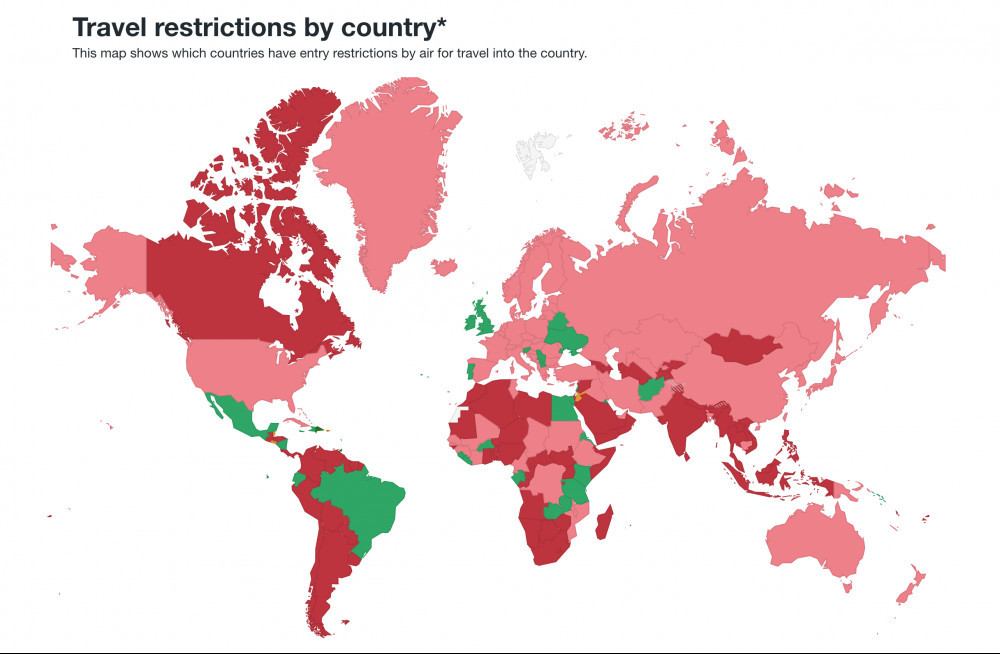
You don’t want to plan to go somewhere only to find out later that it’s no longer possible, and you were acting on outdated information. You will want to check all of these websites (with exception of the U.S. Citizen ones if you’re a citizen of another country). I suggest reviewing each and every website’s information because there will be inconsistencies from one source to the next with regard to the information that they provide.
The name of the game here is to “trust, but verify“. Travel is not the same as it was in the “old normal”. This is a rapidly-changing environment with countries constantly adjusting their border policies as this pandemic plays out.
By the way, if you haven’t already: Find out if you can even get out of your country. This will likely be common knowledge because you’re living there, but in the case that it’s unclear, simply search: “Are *your country*’s borders open” on Google.
Is it Safe to go there?
Once you’ve made sure that your desired country/list of countries is: 1) Possible to travel to from your country, and 2) Attractive to visit, there are a few things you will want to ask yourself before you go:
Does this Country have any Quarantine/COVID Rules?
How has this Country handled COVID? (How much Risk am I taking on by going there?)
Am I putting those around me at Risk?
What are the Pre-Pandemic Travel Requirements for this Country?
Will I have to Self-Quarantine when I return to my Home Country?
Does this Country have any Quarantine/COVID Rules?
You will want to check if your desired destination has any travel restrictions and quarantine rules, as this may affect your decision to travel there. If there are quarantine rules, make sure you are willing to comply with them.
Check the following sources to find up-to-date information on travel restrictions & quarantine rules:
1) Your Government’s Travel Website: It will likely be your best resource. Since it’s your government’s travel website, the information on each country’s travel policies will be specific to people from your country. Government websites are also *typically* the most up-to-date & accurate.
If you are a U.S. citizen, you can access the U.S. government’s travel website here. Scroll down the list until you find the name of any country(s) that you would like information on, and you will be able to verify if that country is currently accepting U.S. travelers as well as find out about that country’s COVID quarantine rules (if there are any).
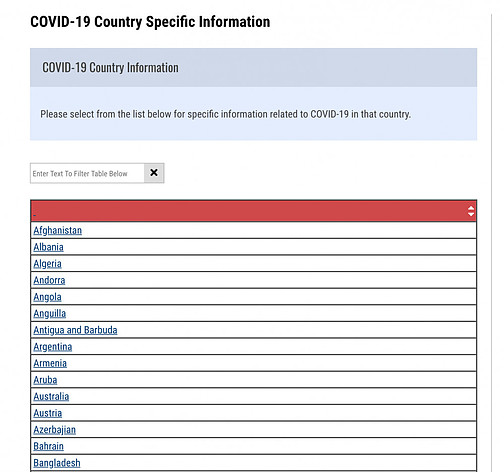
If you are NOT a U.S. citizen, search: “*Your country*’s government travel website” on Google, and look for their COVID-19 travel information page. Your country may not have a travel website. In that case, move on to the section below.
2) Your Embassy’s Website in the Country you would like to Visit: This is also a very reliable source to find up-to-date information. Again, this will be a government site, so the information is likely to be very accurate.
To access this type of source, search: “*Your country*’s embassy in *the country you’d like to visit*” on Google, and then find that website’s COVID-19 information section.
Example: U.S. Embassy in Belarus COVID-19 Information Section

3) The Third Party Websites: Although these resources are not as trustworthy or up-to-date as the previous two types, they are still useful to check when you’re gathering information, because the objective is to check as many sources as possible so that you don’t miss anything:
- Interactive Map w/Travel Restrictions by Country
- Country-by-Country Information (by Delta Airlines)
- General Info about Countries most affected by COVID
- For U.S. Citizens:
**Pro Tip**–> Email the Consulate of the Country you would like to Visit: If there is any travel restriction or quarantine rule that seems outdated or that you would like clarification about, email your country’s consulate for the country you are thinking of visiting. They will be able to answer your question with the most up-to-date information available to them.
I had a question about whether a COVID-19 test was required to enter Belarus (the information online was inconsistent) and the Belarusian Consulate was very prompt in their reply:
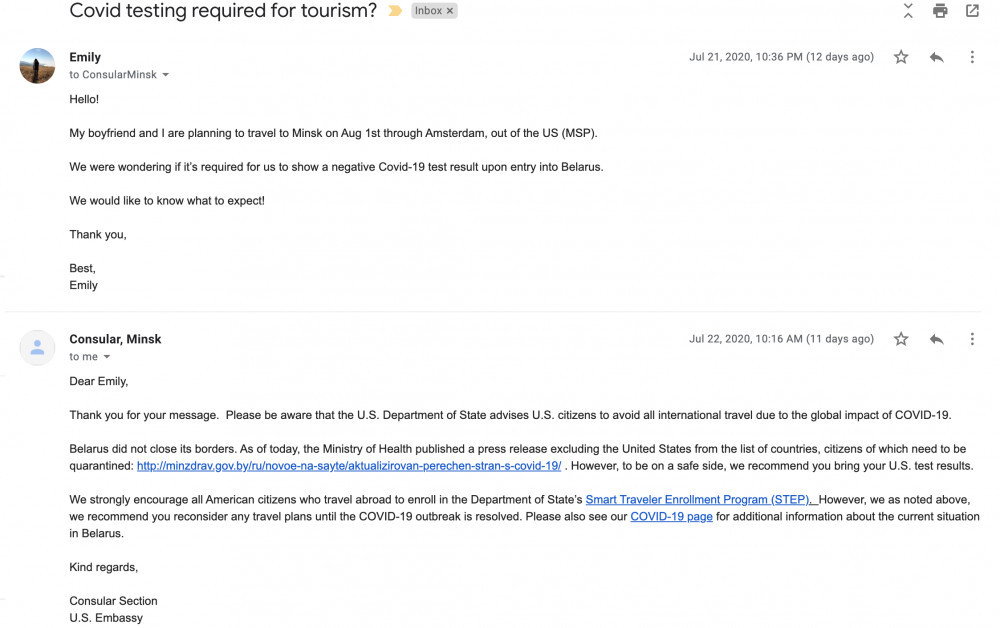
How has this Country handled COVID (How much Risk am I taking on by Going there)?
There are a few reasons why this is a good topic to investigate:
First, knowing about the measures this country has taken will give you a better sense of how seriously they have treated this pandemic. If you feel like they haven’t taken severe enough measures, that might deter you from visiting because it could put you at higher risk of getting the virus.
Additionally, it’s a good idea to be aware of the quarantine measures that this country has undergone in the case that you get stuck there. Remember, this is a constantly-changing situation, so there could be any number of reasons why you’d get stuck in this foreign country. Your home country could close it’s borders while you’re abroad, you could get COVID-19 while you’re in that foreign country, or that country could close it’s borders suddenly – shutting you in. You want to be aware of what to expect in the case that you are stuck there, and make sure that you are comfortable going through another wave of the coronavirus under that country’s restrictions.
Finally, looking at COVID-19 statistics for that country is a must. Check the “Confirmed Cases : Deaths” ratio to get an idea of how prepared this country’s medical system has been for the pandemic, and how likely it is that you will get high quality treatment should you get sick while you’re traveling. In addition, it is always good to know if this is a country where cases of COVID-19 are declining (A.K.A – they are “flattening the curve”) or rising (indicating that that country is likely to go through another wave of the virus), so that you can asses the health risk you’d be taking on by traveling there. **Keep in mind that these numbers may not be 100% accurate**
Wikipedia is my preferred resource for this country-specific coronavirus information. Although not a great source to cite in research papers, it’s amazing for doing COVID research. Search: “Wikipedia coronavirus in *desired country of travel*” on Google, and you will be able to read about how the country has handled COVID-19 thus far as well as look at graphs showing how the pandemic has progressed there.
Here is an example of what this process would look like if you were thinking about going to Belarus:
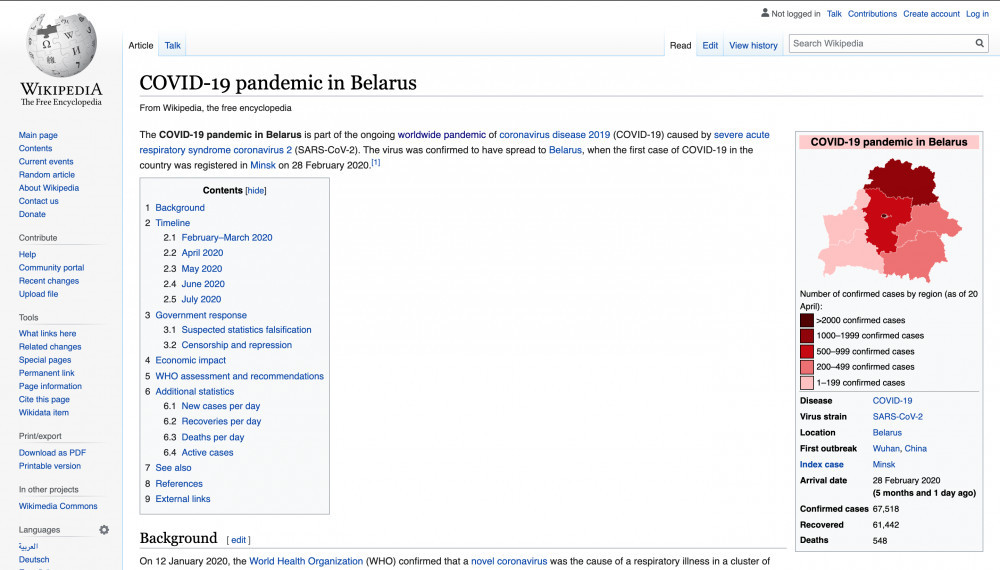
When you scroll down to the “Additional Statistics” section, you will be able to see graphs indicating if the cases in that country are rising or declining:
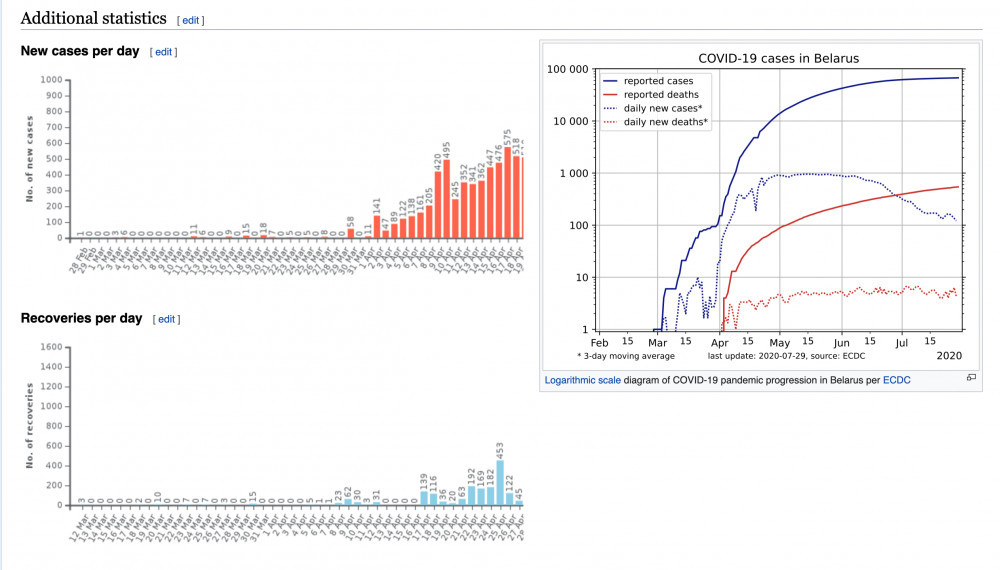 If you feel comfortable with potentially getting stuck in this country & undergoing another wave of the virus there under their quarantine measures, and the curve looks like it’s flattened, you should then consider how much risk you are exposing those around you to by traveling.
If you feel comfortable with potentially getting stuck in this country & undergoing another wave of the virus there under their quarantine measures, and the curve looks like it’s flattened, you should then consider how much risk you are exposing those around you to by traveling.
Am I putting those around me at Risk?
Ask yourself the following questions:
– Is COVID-19 spreading in my community?
In these times, we want to try to be as responsible as we can, and the last thing we want to do is bring the virus to a community in another country. If you are coming from a community where the virus is currently spreading be conscious that you could be asymptomatically carrying the virus. I would advise you to be extra cautious leading up to your departure date by wearing a mask, social distancing, and getting a coronavirus test the week before you leave to make sure you don’t become a “super-spreader”.
– Am I living/traveling with someone who is at risk of getting very sick from COVID-19?
You may not want to travel with someone who has any underlying condition that would make them very sick if they got the virus. In addition, you may unknowingly bring the virus back home after your trip. This is important to keep in mind before you decide to travel.
This should go without saying, but DO NOT TRAVEL if you are sick or if you have been exposed to someone with COVID-19 in the 14 days leading up to your flight.
What are the Pre-Pandemic Travel Requirements for this Country?
It’s easy to get caught up in the “new normal” and all of it’s coronavirus travel restrictions, but don’t forget about the “old normal” travel requirements (i.e. if you need a visa to travel there, how long you can stay, etc.).
If you need a visa to visit your desired country of travel, check with the embassy in your country to find out if getting a visa is possible and, if so, how long the process might take.
Will I have to Self-Quarantine when I return to my Home Country?
Some countries/local governments within countries are requiring people to self-quarantine for 14 days after traveling abroad. For example, in the U.S., there are certain states that will fine you if you do not quarantine when you return, but this does not apply for all 50 states. Know the policy for your local community so that you can be prepared to miss work or school if a 14-day quarantine is mandatory upon your return.
Take your Time
It is very important to be thorough in the research and selection of your travel destination. It is not a great idea to rush through the location selection, as you will likely miss out on some crucial bit of information. There is a good chance that, in Coronavirus times, missing out on an important detail will prevent you from traveling to that place, potentially causing you to lose the money that you invested into your tickets and accommodation.
So take your time when making these decisions. Double and triple check every COVID and visa requirement. Stretch this process out over a few days – Do not rush to book just because you are dying to go somewhere.
I believe travel can still be a good thing. As long as we are doing our best to be safe & responsible, there is nothing to feel guilty about. Travel is therapeutic, exhilarating, and it exposes you to new ways of thinking about the world. Despite all the new restrictions and moral concerns we now face, don’t be afraid to get out there. The world is moving toward a new normal and we should learn how to live (and travel) in it.
In the next Coronavirus Travel Installment, I will be going over how to book a flight & accommodation as well as precautions to take when traveling.
Comments
One response to “Travel during Coronavirus? – Before you Book”
Thanks for this! Have you found good insurance options that also cover you back home in the US for shorter stints? Having a heck of a time finding something that covers my destination country’s requirement for $2000 emergency accommodations/lodging and also covers US. Seems like companies offer either international travel insurance that doesn’t cover US, or comprehensive medical insurance that covers US but doesn’t have any travel coverage like the requirement I mentioned.
Or, have you separately found a good, affordable US health insurance option to purchase in addition to an international travel plan?

Leave a Reply